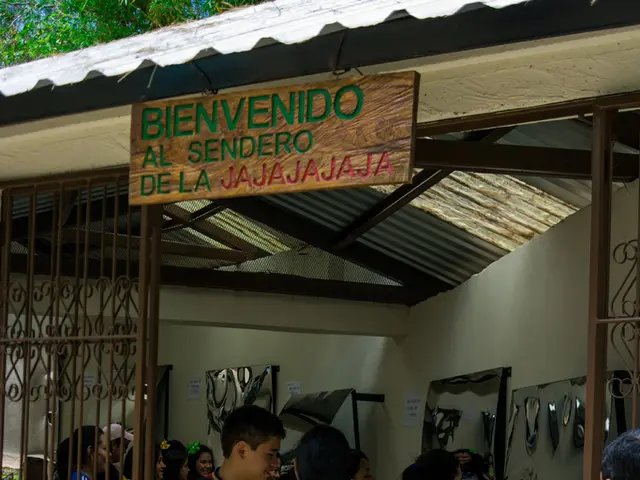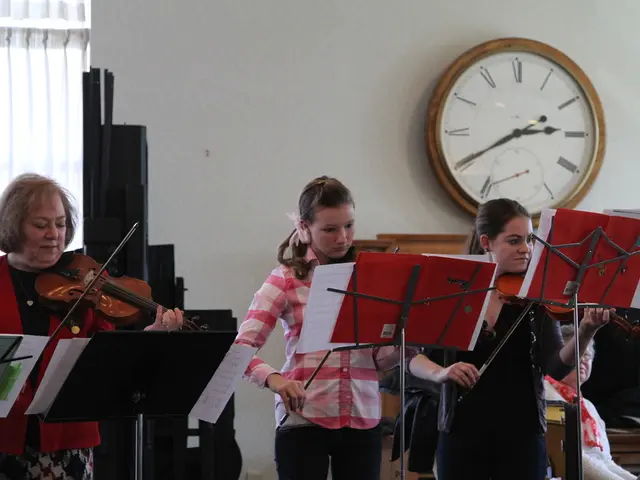Berlin initiates trial program tracking teaching hours for educators
In a significant shift towards addressing the long-standing issue of teacher overwork, Berlin is considering launching a pilot project for teacher work time recording starting potentially in early 2026 [1][2][3]. This marks a notable change in stance from previous years, where official time tracking for teachers has been met with resistance.
Berlin’s Education Senator, Katharina Günther-Wünsch (CDU), has shown openness to discussing this issue with the Gewerkschaft Erziehung und Wissenschaft (GEW), the main teachers’ union [1][2][3]. This change in stance is particularly significant given that Senator Günther-Wünsch was previously the president of the Kultusministerkonferenz, where she sought exemptions for teachers from mandatory work time recording.
The union GEW advocates for full recording of actual working hours and calls for creating measures to reduce excessive workloads based on this data, emphasizing health protection, educational quality, and making the teaching profession more attractive [2]. They propose working jointly with school personnel councils to find a practical system to measure the often underestimated tasks teachers perform outside of lessons [2].
The union criticizes the current approach of the Senate, accusing it of merely waiting out the problem and implementing superficial relief measures that are undone by cuts elsewhere [2]. To address this concern, the Senate plans to test a work time recording system that can be designed with the least effort and coupled with relief mechanisms [2].
Notable opposition to the proposed pilot project comes from Beate Maedebach, the IBS chairwoman, who voices concerns about data collection just for the sake of data collection and the potential for additional work for teachers in a limited pilot phase [2].
In Germany, work time recording systems for teachers are becoming an unavoidable development, driven by recent legal rulings and growing political pressure to acknowledge the full extent of teachers' work beyond just classroom hours [1]. This shift challenges the traditional "deputy system" (Deputatsmodell), which has so far counted mainly teaching hours and largely ignored additional duties, thereby masking actual workload and contributing to chronic overwork [1].
Other school associations and ministries in Germany have been more resistant or slow to act, but Berlin appears to be at the forefront of change [1][3]. The expected outcome is a fundamental transformation of how schools organize teacher work, moving away from focusing only on teaching hours towards a comprehensive understanding of workload [1]. This could lead to calls for increased staffing levels: estimates suggest thousands of additional teachers will be necessary once actual workloads are known [3].
Berlin’s developments represent a significant shift in a country where many Kultusminister have long resisted mandatory teacher work time tracking [1][3]. The pilot project in Bremen will test timely work time recording under real conditions, with a particular focus on previously less visible but time-intensive tasks [3].
In summary, Berlin is moving towards implementing a pilot work time recording system for teachers as early as 2026, with strong involvement from the GEW and cautious but growing political support. This development is part of a broader, transformative trend in Germany that could reshape school work organization and address teacher overwork more effectively.
- Berlin's push for a pilot project to record teacher work time, set to potentially start in 2026, is driven by a bottom-up movement rooted in health protection, educational quality, and making the teaching profession more attractive - all key elements in the discourse of health-and-wellness and education-and-self-development.
- Berlin's Education Senator, Katharina Günther-Wünsch, is now engaging in dialogue with the Gewerkschaft Erziehung und Wissenschaft (GEW), a shift that aligns with the domain of policy-and-legislation and politics, as they jointly seek solutions to reduce excessive workloads and improve the teaching profession.
- The proposed work time recording system in Berlin has sparked discussions on the implications for data collection and potential additional work for teachers, which brings us to the general-news arena as observers weigh in on the potential impact of such a policy.
- The push for work time recording and policy changes is not limited to Berlin; it's part of a broader movement in Germany, challenging traditional work systems and increasing pressure on ministries and school associations to implement changes for the betterment of their workforce - a testament to the evolving landscape of science and workplace-wellness.




